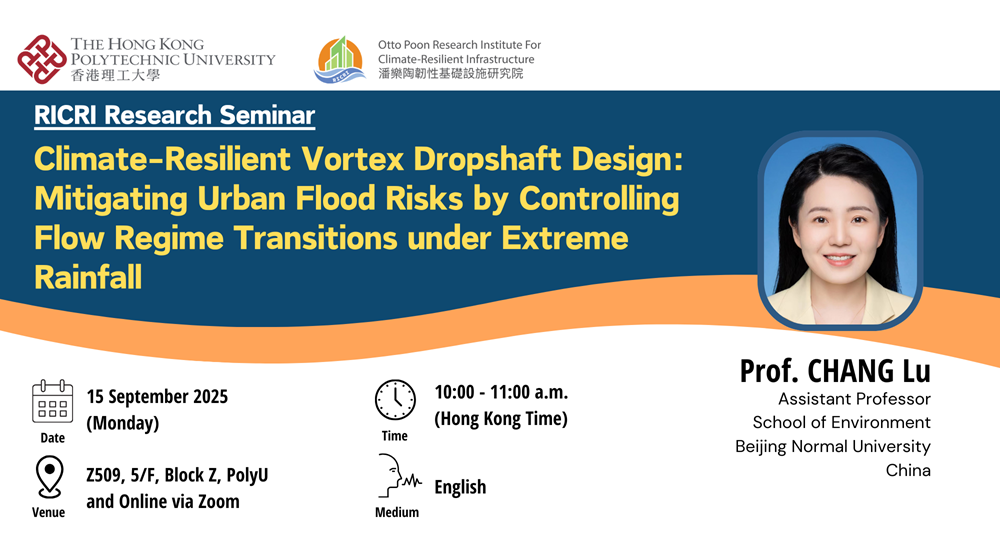RICRI Research Seminar: Climate-Resilient Vortex Dropshaft Design: Mitigating Urban Flood Risks by Controlling Flow Regime Transitions under Extreme Rainfall
Conference / Lecture

-
Date
15 Sep 2025
-
Organiser
Otto Poon Research Institute for Climate-Resilient Infrastructure (RICRI)
-
Time
10:00 - 11:00
-
Venue
Z509, 5/F, Block Z, PolyU and Online via Zoom
Speaker
Prof. CHANG Lu
Enquiry
RICRI ricri@polyu.edu.hk
Summary
Climate change-induced extreme rainfall events pose unprecedented challenges to urban drainage systems, making the hydraulic performance optimisation of drop shaft in drainage structures critically important for effective stormwater management. The flow regime transition mechanisms between plunging and vortex flows in drop shafts with tangential intakes are investigated using an integrated approach combining 3D numerical simulations, physical experiments, and analytical solutions. Five distinct flow regimes are identified: weak drop flow, moderate drop with weak rotation, strong drop with moderate rotation, partial blockage with strong rotation, and severe blockage. Comprehensive criteria are developed for flow regime identification: pressure ratio criterion, velocity ratio criterion, and dimensionless drop height criterion. The findings provide practical design guidelines for optimising drop shaft performance in urban drainage systems capable of managing climate change-driven extreme rainfall, with the proposed criteria enabling real-time monitoring and operational control of flow regimes during intense storm events.
Keynote Speaker

Prof. CHANG Lu
Assistant Professor, School of Environment, Beijing Normal University, China
Prof. CHANG Lu is currently an Assistant Professor in the School of Environment at Beijing Normal University. She earned both her bachelor's and master's degrees in hydraulic engineering from Tianjin University, China, and subsequently obtained her PhD from the Hong Kong University of Science and Technology (HKUST), where she also worked as a postdoctoral associate for two years. She specialises in heavy metal contamination and transport in drinking water systems, urban flood drainage infrastructure, and early warning systems for algal blooms. Using interdisciplinary approaches and computational fluid dynamics (CFD) modelling as her primary research tools, she pursues two interconnected research objectives: 1) supporting coastal cities in addressing challenges related to water security, flood management, and environmental protection, and 2) enhancing urban water security resilience under climate change while developing nature-based solutions.


